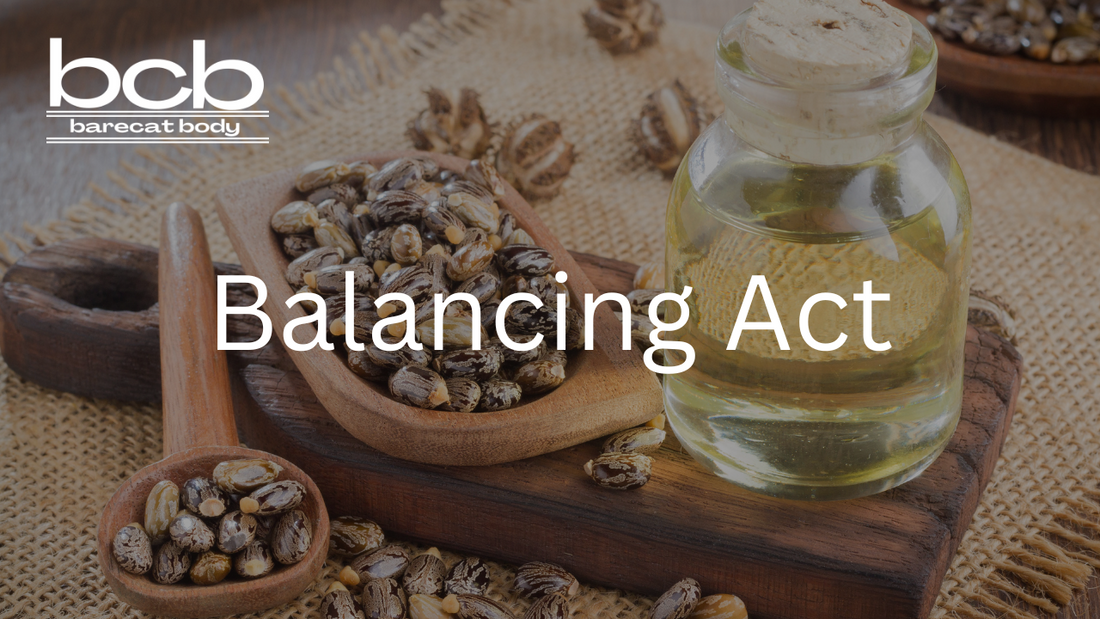
Balancing Act: Understanding Castor Oil's Drying Effects and Finding Harmony in Skincare
Share
As the owner of a natural body care product business, I'm dedicated to promoting the use of natural ingredients for healthy and vibrant skin. Today, we'll discuss an essential aspect of skincare that doesn't always receive the attention it deserves: the potential drying effects of castor oil and how to avoid overusing this powerful but sometimes misunderstood ingredient.
The Versatile Castor Oil: A Double-Edged Sword
Castor oil, with its impressive array of benefits, has gained popularity in the world of natural skincare. It's celebrated for its moisturizing, cleansing, and anti-inflammatory properties, making it a valuable addition to many skincare products. However, there's a fine line between harnessing its advantages and experiencing its unintended side effects.
Understanding Castor Oil's Drying Potential
The potential for castor oil to dry out the skin often surprises many, given its reputation for moisturization. To grasp this paradox, we must delve into the science behind this multifaceted ingredient.
1. Ricinoleic Acid Content: Castor oil is predominantly composed of ricinoleic acid, an omega-9 fatty acid. While this acid contributes to many of the oil's therapeutic properties, it also has drying tendencies. Ricinoleic acid can act as an astringent, which may lead to moisture loss when used excessively.
2. Stripping of Natural Oils: Castor oil has a cleansing nature, and when used in excess or without dilution, it can strip the skin of its natural oils. These oils are essential for maintaining the skin's protective barrier and moisture balance.
3. Individual Skin Types: Not all skin types react the same way to castor oil. Those with already dry or sensitive skin may be more susceptible to its drying effects.
How to Avoid Overusing Castor Oil
While castor oil has a place in your skincare routine, it's essential to use it thoughtfully to prevent over-drying your skin. Here are some practical guidelines to ensure you strike the right balance:
1. Dilution Is Key: If you wish to use castor oil on its own, ensure that it's well-diluted with a carrier oil, such as jojoba, almond, or coconut oil. This will reduce its drying impact while retaining its benefits.
2. Patch Testing: Before incorporating castor oil into your skincare regimen, perform a patch test on a small area of your skin. This will help you gauge your skin's reaction and tailor your usage accordingly.
3. Know Your Skin Type: Understanding your skin type is essential. If you have naturally dry skin, it's crucial to use castor oil sparingly and perhaps only in combination with other, more moisturizing oils.
4. Balanced Formulations: When using skincare products containing castor oil, look for balanced formulations that combine it with other hydrating ingredients. This can mitigate the drying effects and provide a more comprehensive solution for your skin.
5. Limit Frequency: If you are using castor oil as a cleanser or for spot treatments, be mindful of how frequently you use it. Overuse can exacerbate drying effects.
Skincare Regimen: Castor Oil in Context
To maintain a healthy and balanced skincare routine, it's vital to use castor oil as part of a broader strategy. Here's how you can incorporate it wisely:
1. Cleansing: Castor oil can be an excellent addition to your oil cleansing routine. When combined with other nourishing oils, it can effectively remove makeup and impurities without over-drying the skin.
2. Spot Treatment: For targeted issues, like acne or blemishes, use castor oil sparingly. Apply it directly to the affected area and leave it on overnight.
3. Balancing Act: For those with naturally oily or combination skin, castor oil can help balance oil production. However, its use should still be moderated to avoid the drying effect.
4. Formulated Products: Explore skincare products that include castor oil in balanced formulations. This way, you can enjoy the benefits without worrying about overusing it.
The Risks of Overdoing It
Overusing castor oil in your skincare routine can lead to adverse effects. Here are some potential risks:
1. Dryness and Tightness: Overly dry skin can feel tight, uncomfortable, and even appear flaky or rough.
2. Increased Sensitivity: Dry skin is often more sensitive, making it prone to irritation, redness, and inflammation.
3. Compromised Barrier: Stripping the skin of its natural oils can compromise the protective barrier, making it more vulnerable to environmental stressors.
4. Potential Breakouts: Paradoxically, excessively dry skin can lead to an increase in breakouts as the skin attempts to compensate by producing more oil.
Finding the Right Balance with Castor Oil
Castor oil, a versatile and potent natural ingredient, can be a true ally in your skincare journey when used mindfully. Understanding its potential for drying effects and taking appropriate precautions is essential. It's not about avoiding castor oil altogether but about harnessing its power without tipping the balance.
I encourage you to explore the diverse and beautiful world of natural skincare. It's a world where the right knowledge and a balanced approach can lead to radiant and healthy skin. Remember, the key to successful skincare is knowing your skin, listening to its needs, and choosing your products and ingredients with care.
Strike that perfect balance in your skincare routine, and let castor oil's potential shine while avoiding the drying effects. After all, beautiful and healthy skin is a harmonious blend of nature and knowledge.
